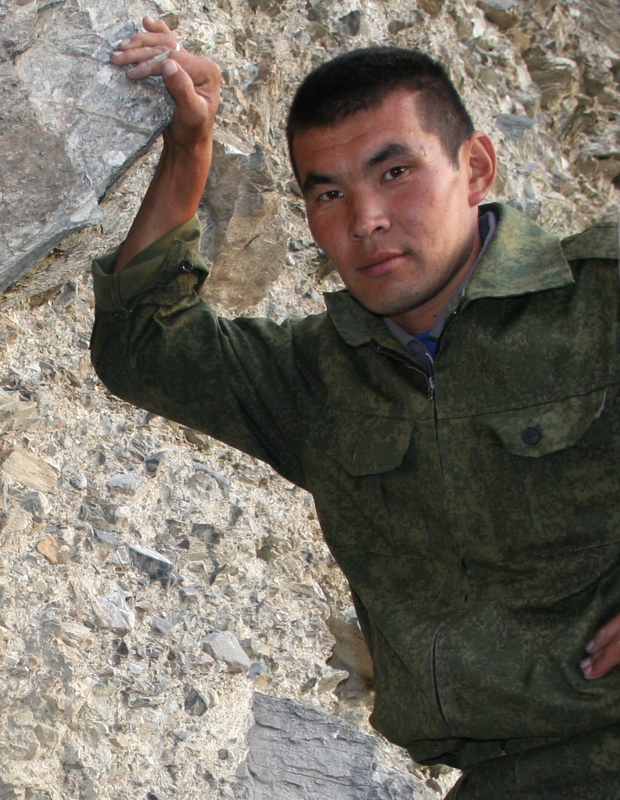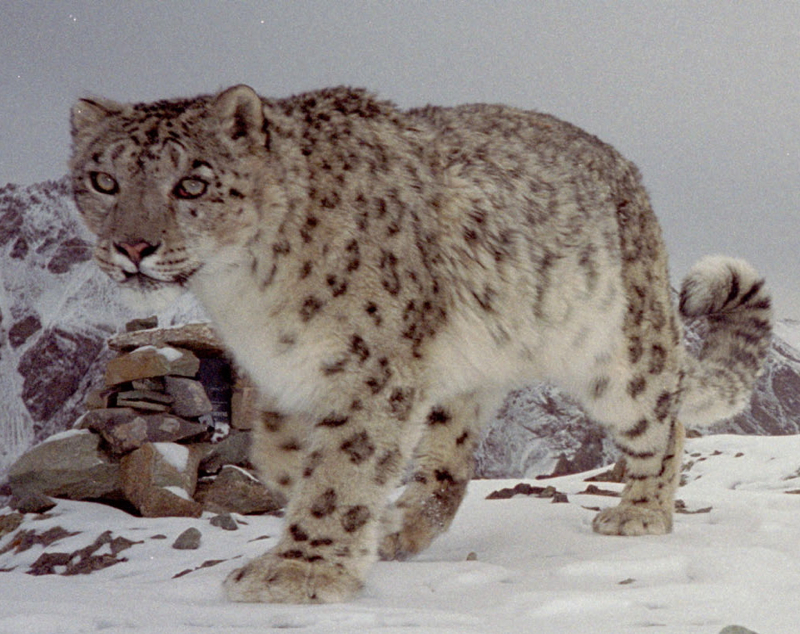There’s a winter storm whistling through the trees outside the window. You can hear the waves beating against the shoreline bluffs over the wind chimes on the house’s eaves. The tired and sated “Sunshine Dog” Rickford snores lightly in a chair, a Rhodesian ridgeback that somehow ended up on the shores of Lake Teletskoye in Altaisky State Nature Reserve. An even warmth rolls off the large brick oven, as if from a cozy and warm campfire…

My memory carries me back a decade to the Argut Valley, where Aduchi and I are sitting by the fire, waiting for kettle to boil. Snow has blocked the mountains from view, covering the steep slopes grazed by maral deer and roamed by Siberian ibex with a thick white blanket.
Like Aduchi’s binoculars, my camera and video camera sit unused in their containers. We’re making tea, waiting out the weather, and talking about life. I tell my cabin-mate about Lake Teletskoye, Altaisky Reserve, our little village of Yailyu there, awkwardly situated at the shore of the lake. I talk about sailing regattas, trekking with youngsters in the reserve, and about our enforcement team.
Aduchi listens carefully, adjusting the logs on the fire. At last, the kettle gives off puffs of peevish steam. I take it off the hook, and my companion pours in loose tea. We put dried mountain currant leaves on top, and the pleasant aroma is carried off by the wind along the steep valley. Pouring the steaming hot beverage into mugs and sprinkling them with a bit of snow, Aduchi pulls a few cans and a loaf of bread out of his pack. Using a large hunting knife, he easily cuts thick slices of bread. I place them on honeysuckle twigs and dangle them over the glowing coals that I had just arranged. The “taiga forest grill” gives off the scent of fried bread. We laughed, imagining envious maral deer glancing covetously in our direction. After a meal of tea and taiga toast slathered with caramelized condensed milk, it is nice to sit by the fire, watching the flames and listening to Aduchi thoughtfully retell his story to our children here in Yailyu…
Aduchi lives with his family in the small but tidy native Altaian village of Inegen on the shores of the tumultuous Argut River. Like his ancestors before him, Aduchi spent his entire life herding sheep and goats. In the summer, he and his herds would climb high up above the tree line, and in the winter, descend again to the valley floor below. Whenever he can, he saddles up his horse and goes into the taiga forest to hunt for meat to feed his family. Aduchi hunts Siberian ibex and maral deer, for there are many of them in these parts and hunting is permitted. Aduchi’s grandfather gave the young hunter his name. When he was born, his grandparents lived far from Inegen. But as soon as he heard of the boy’s birth, the grandfather set out for the village. He traveled many kilometers before reaching the Argut valley and Inegen village. Late one evening, the grandfather entered the traditional wooden ail and approached his sleeping grandchild. He lifted up the boy’s bed pad and set a short whip underneath him to protect the future warrior and hunter from evil spirits. An irbis, or snow leopard, decorated the whip’s handle. Before going to sleep that night, the grandfather told the young parents to call him Aduchi, or “arrow”. The next morning he set off again for home.
As Aduchi grew, he began to spend a lot of time with his grandfather, who in turn taught him to be a shepherd and hunter. The grandson proved to be a quick study and grew into a good herder and successful hunter.
At this point it’s worth saying a bit about the place Aduchi lives, about his family, and about the Argut River valley. In Altai, the Argut is sometimes called a butter churn. Just like cream yields butter when beaten, so does the Argut River’s water, turning over countless stones and falling from great heights. The river’s path is closed on all sides by steep and rocky mountains, and cold air does not reach into Argut in the winter. Because of that, the climate is (relatively) warm, and the slopes are covered in tall and tasty grass grazed upon by large herds of ibex and maral deer. A large wild cat called the Snow Leopard lives on those mountain peaks among the year-round snow. He is also called Irbis. This is a very rare and beautiful creature. The irbis is found not only in Altai, but also in other mountainous areas of our Eurasian continent: in the Pamirs and Tien-Shan, in the Himalayas, and in Tibet. Local peoples consider the snow leopard to be a Sacred Animal, Spirit of the Mountains. Hunting it is forbidden across its range.
Snow leopard on the prowl. Photo by Snow Leopard ConservancyLike many other mountain peoples, the Altaian people have an ancient tradition: in order for a boy to become a man he must meet and conquer the Snow Leopard. However, this encounter should not end in the flow of blood and killing of a snow leopard. The youth remembering that “the best battle is a battle which never occurs,” should force the Big Wild Cat to give way. But as often happens due to human greed, a person cannot hold back and may try to kill a snow leopard for its very beautiful and thus very valuable coat. Because it is nearly impossible to come upon a snow leopard in these mountains among the rocky cliffs and steep chasms, evil and greedy people set snares and traps for the animal.
Aduchi learned the difficult skill of hunting at his grandfather’s knee and held carefully to the ancient traditions of his people, never ever setting snares or traps for the Snow Leopard. But like all young men of his sort, he always wanted to meet a snow leopard on the trail and to match strength for strength in an even battle. That encounter happened when Aduchi was still a very young hunter.
One February, near the end of winter when the days were getting longer and the sun was so warm that mosquitoes and butterflies were waking up in the stony Argut valley, the young man set out to hunt. He had a license to kill one maral deer. Aduchi saddled his horse, loaded up his archimak saddlebags with groceries, hunting gear, and a sleeping bag. He slung his rifle over his back and climbed on his horse, setting off at a leisurely pace up the steep mountain trail. After one day, the hunter reached the place where there were always maral and ibex to be found. Aduchi left his gear and groceries in a shepherd’s cabin on the banks of the Argut and continued on horseback, climbing the steep trail to the uppermost peaks, where a herd of maral was grazing on the broad and colorful alpine meadows. In one very narrow spot, where on the one side an enormous cliff towered over him and on the other was a sheer drop into the chasm below, the hunter met the Snow Leopard. An irbis unexpectedly came around the corner on the trail and froze, nervously lashing its sides with its long tail. Aduchi’s horse froze beneath him like a stone, and the hand of the young hunter was already reaching for the rifle out of long habit. The Wild Cat watched his movements carefully, not moving. And when Aduchi’s palm lay on the grip of the rifle and pulled it to him, Something or Someone caught hold of rifle butt and did not allow the hunter to aim the rifle to take a shot. The Snow Leopard looked the youth straight in the eyes, and it seemed to read his thoughts and desires. The hunter lowered his rifle but did not shift his gaze. Time stopped for the two warriors – Human and Animal, having met on the battlefield of a twisting mountain path. Around them, everything else froze in expectation of the meeting’s outcome. The maral deer nearby froze in the meadows. The wind died in the forest canopy. Even the ever-present mountain jackdaws quieted and disappeared from the heavens. Aduchi’s heart, which at first had threatened to jump out of his chest at the meeting, suddenly calmed. The young hunter felt and believed that the Irbis would not hold his gaze much longer. And the Wild Cat, visibly recognizing the young hunter’s victory, stopped nervously whipping its tail, turned its gaze away, gave a long meow, and hurriedly disappeared into the rocky cliffs.

Aduchi gave a deep sigh and dismounted from his horse. He sat quietly on a rock to think. He felt that this meeting with the Snow Leopard had not been in vain. The hunter was filled with a feeling of unlimited freedom and confidence in his own power, given to him by the Irbis during their encounter. He felt himself in harmony with the surrounding world. However, one lonely thought disturbed him – what was it that had stayed his hand when he reached for his rifle? Aduchi looked carefully around him, examining the horse, his saddle, and the hanging whip with the snow leopard image on its handle. The whip that his grandfather had tucked underneath him on the day of his birth to protect him from evil spirits and bad actions.
That is the end of the story about the young hunter’s adventure. He met the Snow Leopard and conquered him in a fair duel. Ever since, Aduchi has become a real man: a successful hunter, a good shepherd, a loyal husband, and good father. His children are growing and he, like his grandfather before him, is teaching them the herding and hunting way of life. And the Irbis – Spirit of the Mountains – is protecting his family.
Today Aduchi Beletov works as a state enforcement inspector and ranger in Sailyugem National Park at the border of China, Mongolia, and Russia. Part of the Argut watershed, Aduchi’s homeland, is one of the park’s so-called clusters. Aduchi has a wife and three children, two girls and a boy. And today Aduchi “Arrow” is doing everything he can to ensure that his son, when he grows up a bit, can meet a Snow Leopard in the Altai Mountains and look him in the eye.
A semi-biographical story about Aduchi Beletov’s life written by Evgeny Veselovsky, education specialist and master storyteller at Altaisky Federal Nature Reserve, Yailyu,
Information source